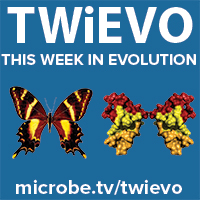At ASM Microbe in San Francisco, Nels and Vincent meet up with Talia Karasov who reveals that in contrast to agriculture, wild plants are colonized by multiple lineages of pathogenic bacteria.
At ASM Microbe in San Francisco, Nels and Vincent meet up with Paul Turner to talk about evolutionary considerations in using bacteriophages to treat infections with antibiotic-resistant bacteria.
Dustin Rubinstein joins Nels and Vincent to discuss coevolution of genome architecture and social behavior, and studying social transitions in sponge-dwelling snapping shrimp.
Nels and Vincent review the contribution of multiple Denisovan lineages to the modern Papuan genome.
Nels and Vincent explore the evolution of new protein-coding genes de novo from nocoding DNA sequences, using the antifreeze protein of northern codfish as a model.
Nels and Vincent move back to reproductive isolation – this time, pre-zygotic, in the charismatic orchid bee where the males make chemically distinct perfumes to attract mates of the same species.
Nels and Vincent look at the intracellular bacteria Legionella from an evolutionary perspective: the role of gene acquisition and reshuffling from plants, animals, fungi, and archaea in the emergence of human pathogens.
Nels and Vincent reveal a highly conserved protein that acts as an evolvability factor, increasing mutation and the ability of bacteria to become resistant to antibiotics.
David Quammen joins Nels and Vincent to talk about his new book, A Tangled Tree, including evolutionary trees, Carl Woese, Lynn Margulis, horizontal gene transfer, and much more.
Mia joins Nels and Vincent to unravel their finding that the transposons that maintain the ends of chromosomes in Drosophila have evolved in conflict with the genome.



